- Home
- J. G. Ballard
Cocaine Nights
Cocaine Nights Read online
Cocaine Nights
J.G. Ballard
There’s something wrong with Estrella Del Mar, the lazy, sun-drenched retirement haven on Spain’s Costa Del Sol. Lately this sleepy hamlet, home to hordes of well-heeled, well-fattened British and French expatriates, has come alive with activity and culture; the previously passive, isolated residents have begun staging boat races, tennis competitions, revivals of Harold Pinter plays, and lavish parties. At night the once vacant streets are now teeming with activity, bars and cafes packed with revelers, the sidewalks crowded with people en route from one event to the next.
Outward appearances suggest the wholesale adoption of a new ethos of high-spirited, well-controlled collective exuberance. But there’s the matter of the fire: The house and household of an aged, wealthy industrialist has gone up in flames, claiming five lives, while virtually the entire town stood and watched. There’s the matter of the petty crime, the burglaries, muggings, and auto thefts which have begun to nibble away at the edges of Estrella Del Mar’s security despite the guardhouses and surveillance cameras. There’s the matter of the new, flourishing trade in drugs and pornography. And there’s the matter of Frank Prentice, who sits in Marbella jail awaiting trial for arson and five counts of murder, and who, despite being clearly innocent, has happily confessed.
It is up to Charles Prentice, Frank’s brother, to peel away the onionlike layers of denial and deceit which hide the rather ugly truth about this seaside idyll, its residents, and the horrific crime which brought him here. But as is usually the case in a J.G. Ballard book, the truth comes with a price tag attached, and likely without any easing of discomfort for his principal characters.
Cocaine Nights marks a partial return on Ballard’s part to the provocative, highly-successful mid-career methodology employed in novels such as Crash and High Rise: after establishing himself as a science fiction guru in the 1960s, Ballard stylistically shifted gears towards an unnerving, futuristic variant on social realism in the 1970s. Both Crash and High Rise were what-if novels, posing questions as to what the likely results would be if our collective fascination with such things as speed, violence, status, power, and sex were carried just a little bit further: How insane, how brutal could our world become if we really cut loose?
Cocaine Nights asks a question better suited to the ’90s, the age of gated communities and infrared home security systems: Does absolute security guarantee isolation and cultural death? Conversely, is a measure of crime an essential ingredient in a vibrant, living, properly functioning social system? Is it true, as a character asserts, that “Crime and creativity go together, always have done,” and that “total security is a disease of deprivation”? Suffice to say that the answers presented in Nights will be anathema to moral absolutists; the world of Ballard’s fiction, like life in the hyperkinetic, relativistic 1990s, abounds with uncomfortable grey areas.
On the surface, Cocaine Nights is a whodunit and a race against time, but as it proceeds – and as preconceived conceptions of good and evil begin to dissolve – it evolves into a thoughtful, faintly frightening look at under-examined aspects of 1990s western society. As is his wont, Ballard confronts his readers with some faintly outlandish hypotheses unlikely to be embraced by many, but which nonetheless serve to provoke both thought and a bit of paranoia; it’s a method that Ballard has developed and refined on his own, and as usual, it propels his novel along marvellously.
Cocaine Nights doesn’t have either the broad sweep or brute impact of the landmark Crash, but it retains enough social relevance and low-key creepiness to more than satisfy Ballardphiles. As is often the case in Ballard’s alternate reality, it’s a given that his most appealing, human characters turn out to be the most twisted, and that even the most normal of events turn out to be governed by a perverse, malformed logic; that this logic turns out to be grounded in sound sociological and psychological principles is its most horrific feature.
David B. Livingstone
J.G. Ballard
Cocaine Nights
1 Frontiers and Fatalities
Crossing frontiers is my profession. Those strips of no-man's land between the checkpoints always seem such zones of promise, rich with the possibilities of new lives, new scents and affections. At the same time they set off a reflex of unease chat I have never been able to repress. As the customs officials rummage through my suitcases I sense them trying to unpack my mind and reveal a contraband of forbidden dreams and memories. And even then there are the special pleasures of being exposed, which may well have made me a professional tourist. I earn my living as a travel writer, but I accept that this is little more than a masquerade. My real luggage is rarely locked, its catches eager to be sprung.
Gibraltar was no exception, though this time there was a real basis for my feelings of guilt. I had arrived on the morning flight from Heathrow, making my first landing on the military runway that served this last outpost of the British Empire. I had always avoided Gibraltar, with its vague air of a provincial England left out too long in the sun. But my reporter's ears and eyes soon took over, and for an hour I explored the narrow streets with their quaint tea-rooms, camera shops and policemen disguised as London bobbies.
Gilbratar, like the Costa del Sol, was off my beat. I prefer the long-haul flights to Jakarta and Papeete, those hours of club-class air-time that still give me the sense of having a real destination, the great undying illusion of air travel. In fact we sit in a small cinema, watching films as blurred as our hopes of discovering somewhere new. We arrive at an airport identical to the one we left, with the same car-rental agencies and hotel rooms with their adult movie channels and deodorized bathrooms, side-chapels of that lay religion, mass tourism. There are the same bored bar-girls waiting in the restaurant vestibules who later giggle as they play solitaire with our credit cards, tolerant eyes exploring those Unes of fatigue in our faces that have nothing to do with age or tiredness.
Gibraltar, though, soon surprised me. The sometime garrison post and naval base was a frontier town, a Macao or Juarez that had decided to make the most of the late twentieth century. At first sight it resembled a seaside resort transported from a stony bay in Cornwall and erected beside the gatepost of the Mediterranean, but its real business clearly had nothing to do with peace, order and the regulation of Her Majesty's waves.
Like any frontier town Gibraltar 's main activity, I suspected, was smuggling. As I counted the stores crammed with cut-price video-recorders, and scanned the nameplates of the fringe banks that gleamed in the darkened doorways, I guessed that the economy and civic pride of this geo-political relic were devoted to rooking the Spanish state, to money-laundering and the smuggling of untaxed perfumes and pharmaceuticals.
The Rock was far larger than I expected, sticking up like a thumb, the local sign of the cuckold, in the face of Spain. The raunchy bars had a potent charm, like the speedboats in the harbour, their powerful engines cooling after the latest highspeed run from Morocco. As they rode at anchor I thought of my brother Frank and the family crisis that had brought me to Spain. If the magistrates in Marbella failed to acquit Frank, but released him on bail, one of these sea-skimming craft might rescue him from the medieval constraints of the Spanish legal system.
Later that afternoon I would meet Frank and his lawyer in Marbella, a forty-minute drive up the coast. But when I collected my car from the rental office near the airport I found that an immense traffic jam had closed the border crossing. Hundreds of cars and buses waited in a gritty haze of engine exhaust, while teenaged girls grizzled and their grandmothers shouted at the Spanish soldiers. Ignoring the impatient horns, the Guardia Civil were checking every screw and rivet, officiously searching suitcases and supermarket cartons, peering under bonnets and spare wheels.
'I need to be in Marbella by five,' I told the rental office manager, who was gazing at the stalled vehicles with the serenity of a man about to lease his last car before collecting his pension. 'This traffic jam has a permanent look about it.'
'Calm yourself, Mr Prentice. It can clear at any time, when the Guardia realize how bored they are.'
'All these regulations…' I shook my head over the rental agreement. 'Spare bulbs, first-aid kit, fire extinguisher? This Renault is better equipped than the plane that flew me here.'
'You should blame Cadiz. The new Civil Governor is obsessed with La Linea. His workfare schemes are unpopular with the people there.'
'Too bad. So there's a lot of unemployment?'
'Not exactly. Rather too much employment, but of the wrong kind.'
'The smuggling kind? A few cigarettes and camcorders?'
'Not so few. Everyone at La Linea is very happy – they hope that Gibraltar will remain British for ever.'
I had begun to think about Frank, who remained British but in a Spanish cell. As I joined the line of waiting cars I remembered our childhood in Saudi Arabia twenty years earlier, and the arbitrary traffic checks carried out by the religious police in the weeks before Christmas. Not only was the smallest drop of festive alcohol the target of their silky hands, but even a single sheet of seasonal wrapping paper with its sinister emblems of Yule logs, holly and ivy. Frank and I would sit in the back of our father's Chevrolet, clutching the train sets that would be wrapped only minutes before we opened them, while he argued with the police in his sarcastic professorial Arabic, unsettling our nervous mother.
Smuggling was one activity we had practised from an early age. The older boys at the English school in Riyadh talked among themselves about an intriguing netherworld of bootleg videos, drugs and illicit sex. Later, when we returned to England after our mother's death, I realized that these small conspiracies had kept the British expats together and given them their sense of community. Without the liaisons and contraband runs our mother would have lost her slipping hold on the world long before the tragic afternoon when she climbed to the roof of the British Institute and made her brief flight to the only safety she could find.
At last the traffic had begun to move, lurching forward in a noisy rush. But the mud-stained van in front of me was still detained by the Guardia Civil. A soldier opened the rear doors and hunted through cardboard cartons filled with plastic dolls. His heavy hands fumbled among the pinkly naked bodies, watched by hundreds of rocking blue eyes.
Irritated by the delay, I was tempted to drive around the van. Behind me a handsome Spanish woman sat at the wheel of an open-topped Mercedes, remaking her lipstick over a strong mouth designed for any activity other than eating. Intrigued by her lazy sexual confidence, I smiled as she fingered her mascara and lightly brushed the undersides of her eyelashes like an indolent lover. Who was she – a nightclub cashier, a property tycoon's mistress, or a local prostitute returning to La Linea with a fresh stock of condoms and sex aids?
She noticed me watching her in my rear-view mirror and snapped down her sun vizor, waking both of us from this dream of herself. She swung the steering wheel and pulled out to pass me, baring her strong teeth as she slipped below a no-entry sign.
I started my engine and was about to follow her, but the soldier fumbling among the plastic dolls turned to bellow at me.
'Acceso prohibido…!'
He leaned against my windshield, a greasy hand smearing the glass, and saluted the young woman, who was turning into the police car park beside the checkpoint. He glared down at me, nodding to himself and clearly convinced that he had caught a lecherous tourist in the act of visually molesting the wife of his commanding officer. He moodily flicked through the pages of my passport, unimpressed by the gallery of customs stamps and visas from the remotest corners of the globe. Each frontier crossing was a unique transaction that defused the magic of any other.
I waited for him to order me from the car and carry out an aggressive body-search, before settling down to dismantle the entire Renault until it lay beside the road like a manufacturer's display kit. But he had lost interest in me, his spare eye noticing a coach filled with migrant Moroccan workers who had taken the ferry from Tangier. Abandoning his search of the van and its cargo of dolls, he advanced upon the stoical Arabs with all the menace and dignity of Rodrigo Diaz out-staring the Moors at the Battle of Valencia.
I followed the van as it sped towards La Linea, rear doors swinging and the dolls dancing together with their feet in the air. Even the briefest confrontation with police at a border crossing had the same disorienting effect on me. I imagined Frank in the interrogation cells in Marbella at that very moment, faced with the same accusing eyes and the same assumption of guilt. I was a virtually innocent traveller, carrying no contraband other than a daydream of smuggling my brother across the Spanish frontier, yet I felt as uneasy as a prisoner breaking his parole, and I knew how Frank would have responded to the trumped-up charges that had led to his arrest at the Club Nautico in Estrella de Mar. I was certain of his innocence and guessed that he had been framed on the orders of some corrupt police chief who had tried to extort a bribe.
I left the eastern outskirts of La Linea and set off along the coast road towards Sotogrande, impatient to see Frank and reassure him that all would be well. The call from David Hennessy, the retired Lloyd's underwriter who was now the treasurer of the Club Nautico, had reached me in my Barbican flat the previous evening. Hennessy had been disturbingly vague, as if rambling to himself after too much sun and sangria, the last person to inspire confidence.
'It does look rather bad… Frank told me not to worry you, but I felt I had to call.'
'Thank God you did. Is he actually under arrest? Have you told the British Consul in Marbella?'
' Malaga, yes. The Consul's closely involved. It's an important case, I'm surprised you didn't read about it.'
'I've been abroad. I haven't seen an English paper for weeks. In Lhasa there's not much demand for news about the Costa del Sol.'
'I dare say. The Fleet Street reporters were all over the club. We had to close the bar, you know.'
'Never mind the bar!' I tried to get a grip on the conversation. 'Is Frank all right? Where are they holding him?'
'He's fine. On the whole he's taking it well. He's very quiet, though that's understandable. He has a lot to think over.'
'But what are the charges? Mr Hennessy…?'
'Charges?' There was a pause as ice-cubes rattled. 'There seem to be a number. The Spanish prosecutor is drawing up the articles of accusation. We'll have to wait for them to be translated. I'm afraid the police aren't being very helpful.'
'Do you expect them to be? It sounds like a frame-up.'
'It's not as simple as that… one has to see it in context. I think you should come down here as soon as you can.'
Hennessy had been professionally vague, presumably to protect the Club Nautico, one of the more exclusive sports complexes on the Costa del Sol, which no doubt depended for its security on regular cash disbursements to the local constabulary. I could well imagine Frank, in his quizzical way, forgetting to slip the padded manila envelope into the right hands, curious to see what might result, or omitting to offer his best suite to a visiting commandant of police.
Parking fines, building-code infringements, an illegally-sited swimming pool, perhaps the innocent purchase from a dodgy dealer of a stolen Range Rover – any of these could have led to his arrest. I sped along the open road towards Sotogrande, as a sluggish sea lapped at the chocolate sand of the deserted beaches. The coastal strip was a nondescript plain of market gardens, tractor depots and villa projects. I passed a half-completed Aquapark, its excavated lakes like lunar craters, and a disused nightclub on an artificial hill, the domed roof resembling a small observatory.
The mountains had withdrawn from the sea, keeping their distance a mile inland. Near Sotogrande the golf courses began to multiply like the sympt
oms of a hypertrophied grassland cancer. White-walled Andalucian pueblos presided over the greens and fairways, fortified villages guarding their pastures, but in fact these miniature townships were purpose-built villa complexes financed by Swiss and German property speculators, the winter homes not of local shepherds but of Dusseldorf ad-men and Zurich television executives.
Along most of the Mediterranean's resort coasts the mountains came down to the sea, as at the Côte d'Azur or the Ligurian Riviera near Genoa, and the tourist towns nestled in sheltered bays. But the Costa del Sol lacked even the rudiments of scenic or architectural charm. Sotogrande, I discovered, was a town without either centre or suburbs, and seemed to be little more than a dispersal ground for golf courses and swimming pools. Three miles to its east I passed an elegant apartment building standing on a scrubby bend of the coastal road, the mock-Roman columns and white porticos apparently imported from Las Vegas after a hotel clearance sale, reversing the export to Florida and California in the 1920s of dismantled Spanish monasteries and Sardinian abbeys.
The Estepona road skirted a private airstrip beside an imposing villa with gilded finials like a castellated fairy battlement. Their shadows curved around a white onion-bulb roof, an invasion of a new Arab architecture that owed nothing to the Maghreb across the Strait of Gibraltar. The brassy glimmer belonged to the desert kingdoms of the Persian Gulf, reflected through the garish mirrors of Hollywood design studios, and I thought of the oil company atrium in Dubai that I had walked through a month earlier, pursuing my courtship of an attractive French geologist I was profiling for L'Express.
'The architecture of brothels?' she commented when I told her of my longstanding plans for a book during our rooftop lunch. 'It's a good idea. Rather close to your heart, I should think.' She pointed to the retina-stunning panorama around us. 'It's all here for you, Charles. Filling-stations disguised as cathedrals…'

 High-Rise
High-Rise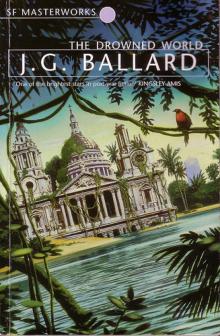 The Drowned World
The Drowned World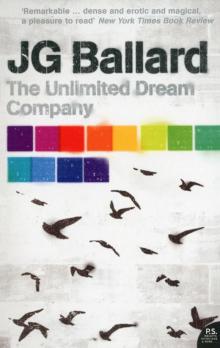 The Unlimited Dream Company
The Unlimited Dream Company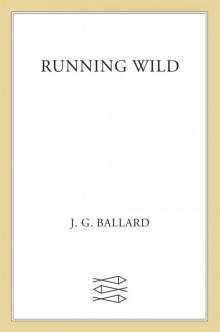 Running Wild
Running Wild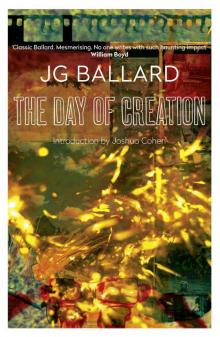 The Day of Creation
The Day of Creation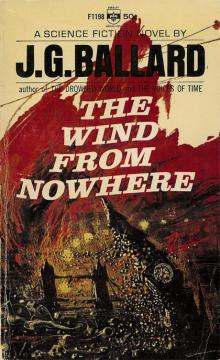 The Wind From Nowhere
The Wind From Nowhere The Complete Short Stories, Volume 2
The Complete Short Stories, Volume 2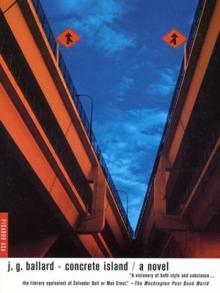 Concrete Island
Concrete Island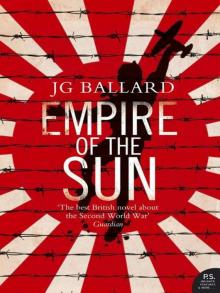 Empire of the Sun
Empire of the Sun The Kindness of Women
The Kindness of Women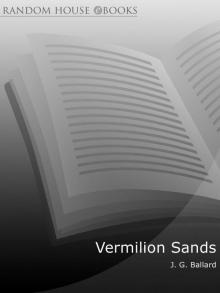 Vermilion Sands
Vermilion Sands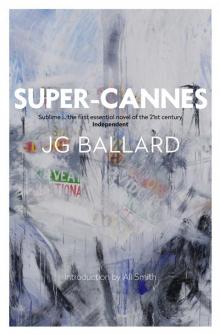 Super-Cannes
Super-Cannes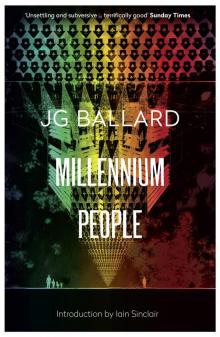 Millennium People
Millennium People The Complete Stories of J. G. Ballard
The Complete Stories of J. G. Ballard Crash
Crash The Drought
The Drought The Atrocity Exhibition
The Atrocity Exhibition The Complete Short Stories: Volume 1
The Complete Short Stories: Volume 1 Miracles of Life: Shanghai to Shepperton: An Autobiography
Miracles of Life: Shanghai to Shepperton: An Autobiography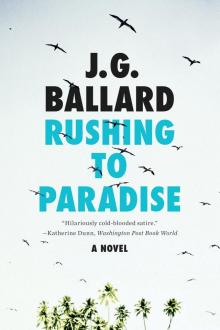 Rushing to Paradise
Rushing to Paradise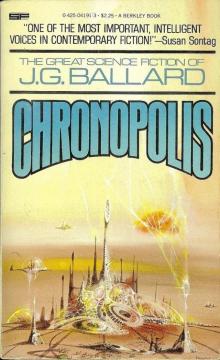 Chronopolis
Chronopolis Cocaine Nights
Cocaine Nights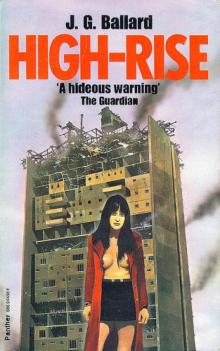 High Rise (1987)
High Rise (1987) The Complete Short Stories
The Complete Short Stories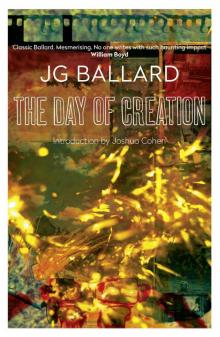 The Day of Creation (Harper Perennial Modern Classics)
The Day of Creation (Harper Perennial Modern Classics) The Crystal World
The Crystal World